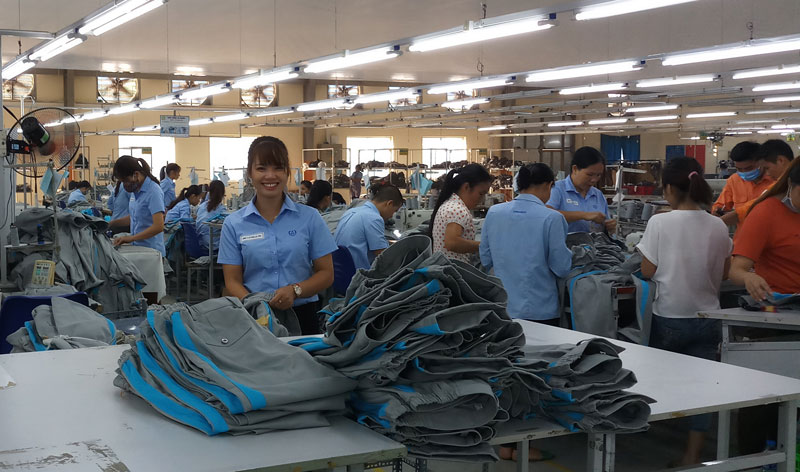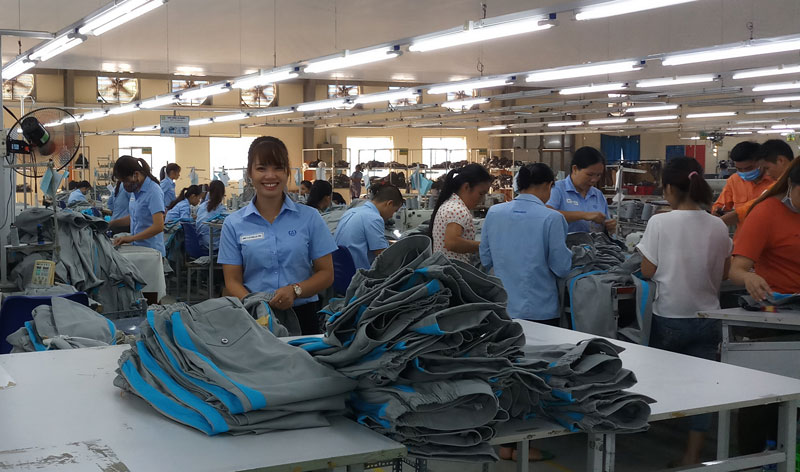
(HBO) – After five years of implementing Resolution 14-NQ-HU issued on April 16, 2013 of Lac Thuy district on investment attraction in the 2013-2018 period, the locality’s economic structure has been transformed towards lower ratio of agriculture and higher ratio of service sector, helping increase budget collection, create more jobs and improve the living conditions of locals.
 Workers of Lac Thuy garment joint stock company prepare shipments to
export to the US.
Workers of Lac Thuy garment joint stock company prepare shipments to
export to the US.
The planning and infrastructure construction in the district
have been conducted effectively. Specifically, a 1:500 scale planning for the
construction of Thanh Ha industrial park was approved with a total area of
282.14 hectares.
Other planning for Phu Thanh I industrial cluster with 23.63
hectares, Phu Thanh II industrial cluster with 138.03 hectares, Dong Tam
industrial cluster with 22.8 hectares, An Binh industrial cluster with 22.85
hectares, and Thanh Nong industrial cluster with 35.2 hectares were also
passed.
The People’s Committee of the district has submitted to the
provincial People’s Committee on the proposal to adjust the planning for Yen
Bong I, II and III industrial clusters with total area of 198.65 hectares.
Compensation and ground clearance have received adequate
attention, ensuring the procedure and progress on 26 projects. Meanwhile, the
district has sped up administrative reform, especially in land use, ground
clearance, business registration, and tax.
So far, the district has hosted 48 projects with total
capital of about 13,930 billion VND, 16 projects higher than that in 2013. Of
which, 28 projects are in industry sector, eight in agriculture, and seven in
mining. As many as 25 projects have become operational, reaching 55.6 percent.
The remaining projects are on the process of performing
investment procedure, infrastructure construction, land reclaim, and ground clearance.
The work is on good progress, creating jobs for local labourers, and contributing
about 75 billion VND to the State budget.
Some major projects are being implemented such as Xuan Thien
lime light-powder production factory; Xuan Thien Lac Thuy port; Huong Binh telpher
in Phu Lao commune; Dong Tam waste treatment plant; and spiritual tourism in
Phu Lao commune./.
According to data from the Hoa Binh Provincial Party Committee, the industrial production index for the first six months of 2025 is estimated to have increased by 20% compared to the same period last year. This marks the highest year-on-year growth rate for this period since 2020.
In the first six months of 2025, Hoa Binh province’s export turnover was estimated at 1.145 billion USD, marking an 18.11% increase compared to the same period in 2024. Import turnover was estimated at $ 804 million, a 17.15% increase, which helped the province maintain a positive trade balance.
The lives of the ethnic minority farmers in Tan Lac district have gradually improved thanks to the new directions in agricultural production. This is a testament to the collective strength fostered through the professional associations and groups implemented by various levels of the district’s Farmers’ Union.
With the motto the "product quality comes first,” after nearly one year of establishment and operation, Muong village’s Clean Food Agricultural and Commercial Cooperative, located in Cau Hamlet, Hung Son Commune (Kim Boi district), has launched reputable, high-quality agricultural products to the market that are well-received by consumers. The products such as Muong village’s pork sausage, salt-cured chicken, and salt-cured pork hocks have gradually carved out a place in the market and they are on the path to obtaining the OCOP certification.
In the past, the phrase "bumper harvest, rock-bottom prices" was a familiar refrain for Vietnamese farmers engaged in fragmented, small-scale agriculture. But today, a new spirit is emerging across rural areas of Hoa Binh province - one of collaboration, organisation, and collective economic models that provide a stable foundation for production.
Maintaining growing area codes and packing facility codes in accordance with regulations is a mandatory requirement for agricultural products to be eligible for export. Recently, the Department of Agriculture and Environment of Hoa Binh province has intensified technical supervision of designated farming areas and packing facilities to safeguard the "green passport" that enables its products to access international markets.



 Workers of Lac Thuy garment joint stock company prepare shipments to
export to the US.
Workers of Lac Thuy garment joint stock company prepare shipments to
export to the US.